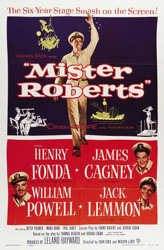 Synopsis: The USS Reluctant carries cargo along World War II’s forgotten Pacific seaways. Beyond the horizon, the real war passes its stir-crazy crew by. Mister Roberts, directed by John Ford and Mervyn LeRoy, is the classic story of men fighting to survive not war’s dangers but it indignities.
Synopsis: The USS Reluctant carries cargo along World War II’s forgotten Pacific seaways. Beyond the horizon, the real war passes its stir-crazy crew by. Mister Roberts, directed by John Ford and Mervyn LeRoy, is the classic story of men fighting to survive not war’s dangers but it indignities.
Henry Fonda’s reprise of his Tony®-winning Broadway role returned him to movies after seven years away. Jack Lemmon won his first Academy Award® as hapless, lecherous Ensign Pulver. James Cagney’s petty, scrappy Captain makes a fierce adversary. In his final film, William Powell makes world-weary Doc a sage for the ages. Mister Roberts has moments of unforgettable humor. But sadness tempers the comedy. No shot is fired. No blood is spilled. Yet Mister Roberts endures as one of our most truthful war sagas
***********************************************************************
Mister Roberts 7.5
Based on the play, this film essentially recounts the shenanigans of the crew of a cargo ship during WWII. Led by Henry Fonda, the crew give their Captain countless headaches – all he wants is order and tranquility so that he may enjoy his cabin, but he’s not getting the respect he craves.
The film is an awkward mix of theatre and cinema. Script-wise, it works very well. However, from a direction and production standpoiint, it’s a minor eyesore – the location scenes simply do not mesh with the ones filmed on set. I’m surprised, due to the fact that it was primarily directed by the legendary John Ford. However, he’s not the only one credited here, so that may explain the discrepancies.
The cast is relatively solid. Strangely enough, the weaker points are some of the main actors, not the secondary ones. James Cagney, who plays the Captain, is absolutely not credible – he is a cartoon character in almost every scene, especially when he plays apoplectic. Henry Fonda, on the other hand, has all the body language right, but his delivery feels unnatual much of the time.
Surprisingly good is Jack Lemmon, who tones down his usual comedy shtick just enough to be realistic, but funny. They are also supported by the amazing William Powell (of ‘The Thin Man’ fame), who gives a sober performance laced with just enough dry humour to make his character a standout.
The story goes through a lot of familiar motions, but I don’t know if it was clichéd in 1955 yet. It’s all done very well, however, and there are a number of twists that keep things fresh enough. I had a good time watching this, and, despite my aversion to wartime settings, I’d watch this again – it’s sharp enough to warrant repeat viewing, I think.